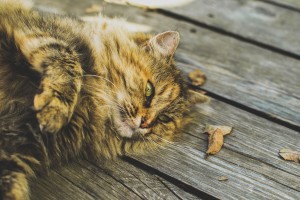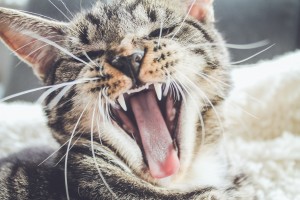Cats are often considered to be independent creatures, capable of taking care of themselves. That isn’t entirely true. You still need to take care of your cat as you would any other pet.
This week, we present to you the top three reasons clients bring the cats in to us at Karingal Vet Hospital and Ballam Park Vet Clinic.
Treating abscesses and fight wounds is the top reason our clients bring in their cats. Untreated abscesses can be painful and cause serious infection. We recommend keeping your cat indoors or confining them to your yard. Not only will this keep native species safe from your little hunter, it will also keep your feline friend out of danger – from other animals and from cars.
Cats that fight are also more likely to contract Feline Immunodeficiency Virus (FIV), a disease spread by cat bites. FIV increases the dangers of infection and disease as your cat’s immune system is compromised: it is unable to fight off everyday bacteria, viruses and fungi. Street cats and cats that roam the streets are more likely to contract FIV as they are the most exposed to aggression and cat-on-cat violence.
In addition to keeping your cat confined, we recommend de-sexing. Cats that have not been de-sexed often have behavioural issues, including aggression. Fighting is common in male cats, and in ones that have not been de-sexed in particular. De-sexing your cat when they are little helps reduce territoriality and aggression.

Feline Lower Urinary Tract Disease (FLUTD) is an inflammatory condition that cats get in their bladders. Poor diets, stress or infection can cause FLUTD.
If you’ve noticed your cat’s urinary behaviours changing recently, it may be due to FLUTD. Some symptoms of FLUTD are:
There’s no single cause for FLUTD and its symptoms may overlap with those of other conditions. A reduced appetite, for example, is often the sign alerting owners there’s something wrong with their pet. It can mean any number of things, including mood, digestive and dental issues. When you bring your cat in to discuss its urination, we will work with you to establish patterns of behaviour to establish a root cause.
The two main things we recommend for FLUTD are: 1) a comfortable, stress-free zone your cat can retreat to; and 2) a healthy, well-balanced diet.
Keep an eye on your cat’s behaviour for any changes and on their environment for any new stressors. Stress-related urinary issues may be treated with acupuncture or Feliway, a cat pheromone spray for your home. If it is exhibiting signs of stress, talk to us about what treatments might be right for your cat.
Diet is a major factor in your pet’s life, mood and energy. Making sure your pet has an appropriate diet is a long-term way of improving their vitality and standard of living. Cats with crystals or stones in their urine may benefit from diets with less magnesium, phosphorous, protein and calcium.

Sneezy, feverish, depressed or inappetant cats may have contracted cat ’flu. Nasal or eye discharge, excessive saliva and ulcers are also signs of cat ’flu.
Feline influenza can be serious, potentially causing eye damage or fever in kittens and life-threatening bacterial infections.
It is important to keep up to date with your vaccinations. Regular vaccinations will reduce the chances of your cat contracting influenza and will lessen the severity of the disease. Read more about vaccinating your cat against here.
So there you have it. Those are the three most common reasons cat owners take their pets to Karingal Vet Hospital.
While you’re here, why not read our other blog posts or check out the Karingal Vet Hospital and Ballam Park team?
If you are concerned about your cat, need to update its vaccinations, or want to talk to us about the right diet, contact us today. Karingal Vet Hospital is open 7 days a week for all your cat care requirements.